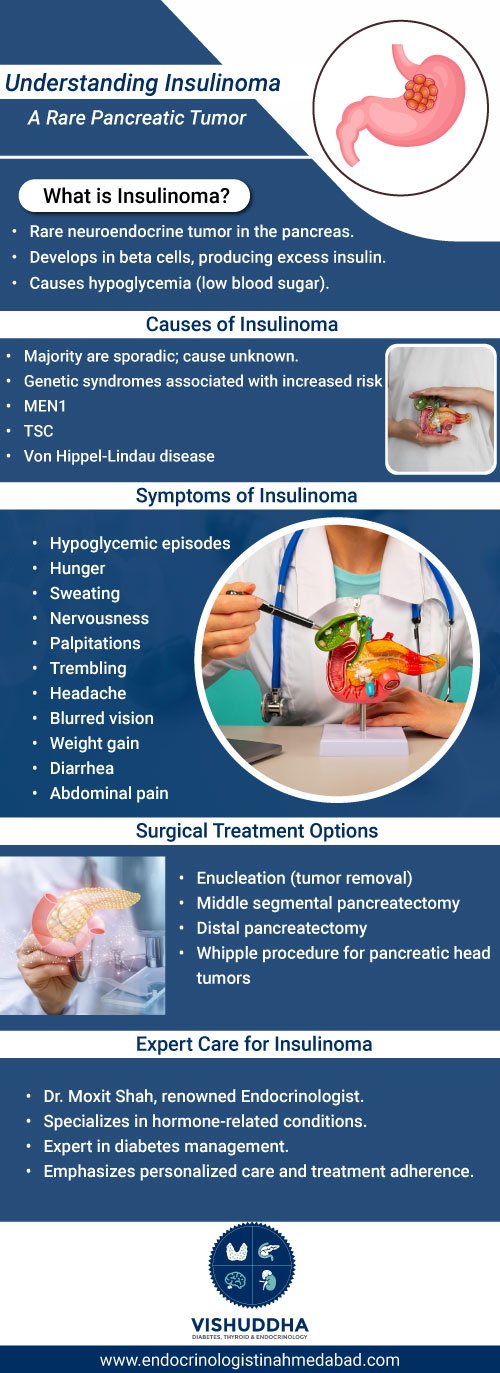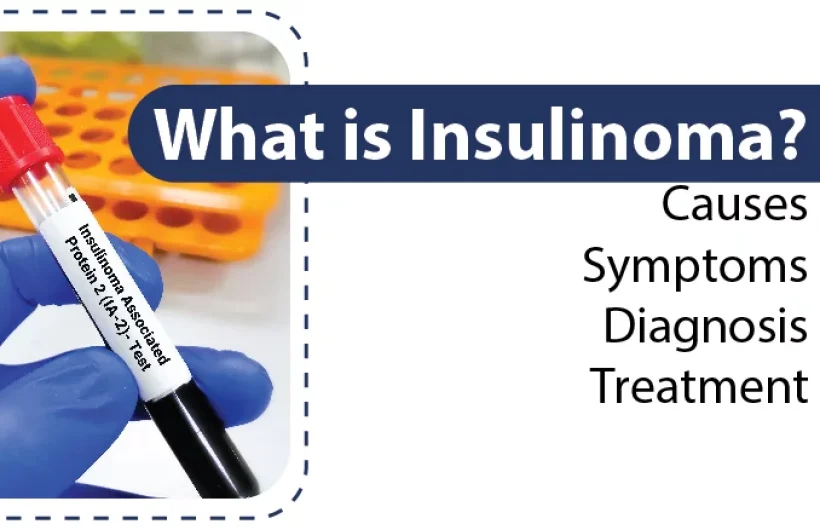What is Insulinoma?
Insulinoma is a rare type of neuroendocrine tumor that develops in the pancreas. Specifically, insulinomas form in the beta cells of the pancreas, which are the cells responsible for producing the hormone insulin. Insulin helps regulate blood sugar levels by signaling the body to take up and use glucose from the bloodstream. Insulinomas cause the pancreas to secrete too much insulin, resulting in abnormally low blood sugar levels, or hypoglycemia.
Insulinomas account for just 1-4 cases per million people each year. They are considered benign, or non-cancerous, tumors in about 90% of cases. The average age of diagnosis is between 40-50 years old. While insulinomas are rare, understanding the causes, insulinoma symptoms, diagnosis, and treatment options is important for anyone experiencing unexplained episodes of low blood sugar.
Most insulinomas are benign, meaning they are non-cancerous and do not spread to other parts of the body. However, in rare cases, insulinomas can become malignant and spread, most commonly to the liver. Insulinomas account for just 1-4% of all pancreatic tumors. On average, only about 1 in 1 million people per year will develop an insulinoma. They usually occur in adults between the ages of 40-60.

What are the Causes of Insulinoma?
The exact Insulinoma cause is unknown in most cases. However, there are a few genetic conditions and syndromes that are associated with an increased risk:
- Multiple Endocrine Neoplasia type 1 (MEN1): MEN1 is an inherited condition that increases the risk of tumors in various endocrine glands. About 10% of insulinomas are linked to MEN1.
- Tuberous Sclerosis Complex (TSC): TSC is another genetic syndrome that can cause benign tumors to form in multiple organs, including the pancreas. A small percentage of insulinomas are caused by TSC.
Von Hippel-Lindau disease: This rare inherited disorder increases the risk of several types of tumors, including neuroendocrine tumors of the pancreas.
In the majority of cases that are not associated with a genetic syndrome, the exact cause remains unknown. Some researchers believe insulinomas may be caused by genetic mutations that occur spontaneously. Overall, the underlying reasons why some pancreatic beta cells become insulinoma tumors are still an active area of research.
Symptoms of Insulinoma
The hallmark symptom of an insulinoma is episodes of hypoglycemia or low blood sugar. When the tumor secretes excess insulin, it causes blood glucose levels to drop rapidly. Common signs and Insulinoma symptoms that occur during a hypoglycemic episode include Hunger, Sweating, Nervousness or anxiety, Palpitations or pounding heart, Trembling or shaking, Headache, and Blurred vision.
Episodes typically happen about 1-2 hours after eating a meal when insulin levels peak. They often occur at night while sleeping or in the fasting state. Other associated symptoms include weight gain, diarrhea, and abdominal pain. Without treatment, hypoglycemic episodes can be life-threatening if severe enough.
Diagnosing Insulinoma
When symptoms suggest possible insulinoma, doctors will conduct various tests to confirm the insulinoma diagnosis:
- Fasting blood glucose test: This test checks blood sugar levels after an overnight fast. Low levels support an insulinoma diagnosis.
- 72-hour fast with frequent blood glucose monitoring: This extended fast is done under medical supervision to provoke hypoglycemic episodes.
- CT scan or MRI of the abdomen: Imaging tests can detect a pancreatic mass suggestive of an insulinoma tumor.
- Endoscopic ultrasound: This endoscopy technique uses sound waves to produce high-quality images of the pancreas.
The combination of symptoms, biochemical testing, and imaging results helps doctors definitively diagnose insulinoma. Ruling out other potential causes of hypoglycemia like late-onset congenital hyperinsulinism is also important.
Surgical Options Based on Treating Insulinoma
Surgery is the primary option for insulinoma treatment and offers the best chance of cure. The goal is to remove the entire tumor while sparing as much normal pancreatic tissue as possible. The type of surgery depends on tumor size and location within the pancreas:
- Enucleation: Removal of just the tumor, leaving the rest of the pancreas intact.
- Middle segmental pancreatectomy: Removal of the pancreatic section containing the tumor.
- Distal pancreatectomy: Removal of the pancreas’ tail section.
- Whipple procedure: A more extensive surgery for insulinomas in the pancreatic head region.
For inoperable or metastatic insulinomas, medical management aims to prevent hypoglycemic episodes. Drugs like diazoxide or octreotide are given to suppress insulin secretion. Newer targeted therapies and chemotherapy may also help control tumor growth.
Tips to Take Care of Yourself if You Have an Insulinoma:
- Follow your treatment plan prescribed by your doctor, whether it’s surgery, medication, or other therapies. This gives your body the best chance of recovery.
- Monitor your blood sugar levels regularly, especially after meals. Keep track of readings and any symptoms of low blood sugar.
- Carry fast-acting glucose-like juice with you at all times in case of hypoglycemia.
- Eat small, frequent meals throughout the day rather than a few large ones. This helps regulate insulin levels.
- Avoid fasting or going too long without eating. Plan snacks accordingly.
- Get plenty of rest to allow your body to heal from any treatment procedures. Fatigue is common.
Outcomes and Prognosis
Lifestyle adjustments may also be needed such as eating small, frequent meals to prevent hypoglycemia. Wearing medical identification and informing others about the condition is prudent in case emergency treatment is needed. With proper management, the majority of insulinoma patients can expect to live normal lifespans. While rare, insulinomas demonstrate how even small pancreatic tumors can profoundly impact health and require vigilant care.
Insulinoma is a rare but treatable cause of hypoglycemia. Surgical removal offers the best chance of cure when possible. Its key features include excess insulin secretion causing recurrent hypoglycemia. A combination of diagnostic testing and surgery offers the best chance of cure in non-metastatic cases. If you want such adherence to treatment plans and monitoring you can contact Dr. Moxit Shah, a renowned Endocrinologist who specializes in diagnosing and treating health conditions related to body hormones and different kinds of diabetes With treatment, most patients can achieve remission and prevent future hypoglycemic events through close medical follow-up and lifestyle modifications.







